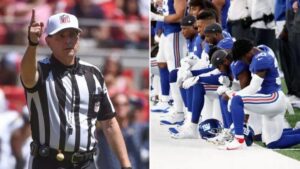
In a move that has stirred considerable debate and controversy within the sports community and beyond, the National Football League (NFL) has recently empowered its referees with the authority to disqualify any player who kneels during the national anthem. This decision marks a significant escalation in the league’s stance against what it deems as acts of protest during the anthem.
The NFL’s relationship with national anthem protests began in 2016 when then-San Francisco 49ers quarterback Colin Kaepernick knelt during the anthem to protest racial injustice and police brutality. Since then, the act of kneeling has transformed into a symbol of protest against societal inequities, eliciting mixed responses from fans, players, and the administration.
Under the new guideline, referees now hold the discretionary power to disqualify any player seen kneeling or engaging in any form of protest during the national anthem. This decision comes in the wake of escalating tensions and varying stances across teams regarding player protests.
The enforcement of this rule places referees in a challenging position, tasking them with a responsibility that extends beyond the standard purview of game-related regulations. Referees, typically focused on maintaining sportsmanship and game rules, must now also enforce political and social conduct on the field.